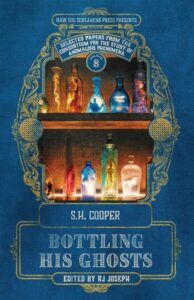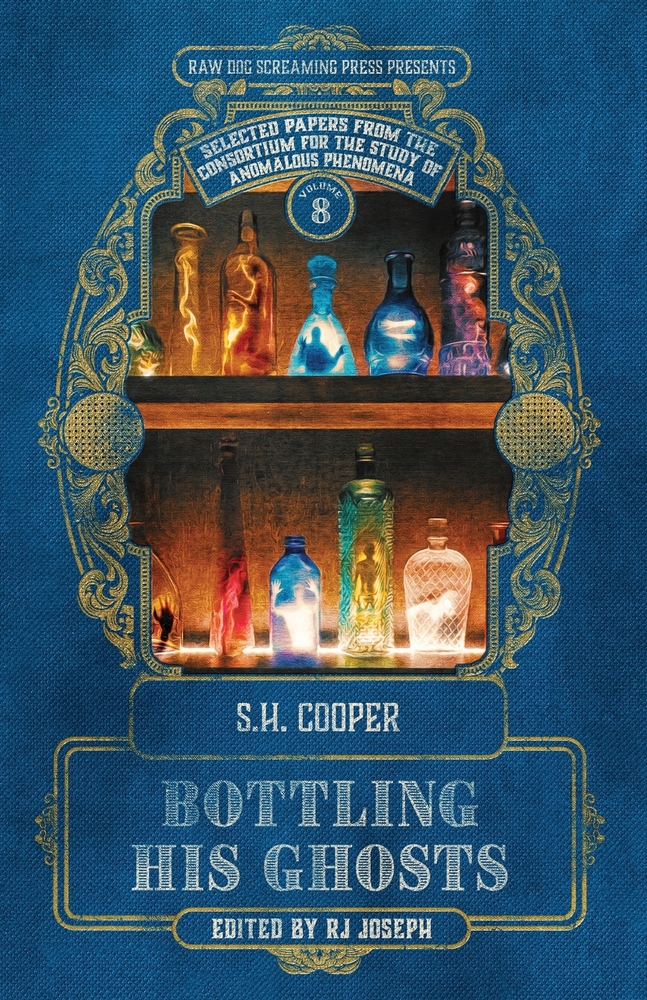FYI: I received an ARC of Bottling His Ghosts by SH Cooper through NetGalley. Many thanks to the publisher for granting my request.
Bottling His Ghosts by SH Cooper is a novella that explores the ghosts we carry with us and how societal expectations determine how we’re “allowed” to grieve.
This post may contain affiliate links, which means I’ll receive a commission if you purchase through my links, at no extra cost to you. Please read full disclosure for more information.

Bookshop
Summary
Victorian England: after the sudden death of her husband in a work accident, Netta returns to her childhood home Daunderhead. Here, she hopes to have space to process her grief.
Instead, she finds her cousin, Thorn – who was like a brother to her – has been drinking heavily and not doing much else with his time.
Can Netta help Thorn conquer his ghosts?
SH Cooper’s Bottling His Ghosts is a short novella that features a mystery surrounding ghosts.
Thoughts
So here’s the thing. Both Netta and Thorn are experiencing grief brought on by trauma. Their trauma may be different, but it’s impacting them nonetheless.
We can talk about how everyone responds to trauma differently, which is true.
But I think that with Bottling His Ghosts, Cooper was trying to make a point about how gender can influence how people are “allowed” to show their grief.
When Netta lost her husband, she was expected to display her grief. She wore black and went to stay with her parents / support network. No one batted an eye.
When Thorn experienced immense trauma, he was told to bottle up his grief. He’s told to “be a man,” to be stoic, to not show his grief.
Because Thorn is not allowed to adequately process his trauma, he turned to some self-destructive behaviors. While it’s never explicitly stated, it’s very possible that Thorn is experiencing PTSD. Studies have shown that people with PTSD often turn to drugs or alcohol to self-medicate.
A Tangent / Rant
There’s often a lot of talk about the “strong female character.” It always bugs me when this term is used to describe female characters who eschew traditionally feminine traits. Yes, adopt some traditionally masculine traits if you want to, but that doesn’t mean traditionally feminine traits are inferior. I would love to see more female characters (and characters of all gender identities, really) possess a mix of traditionally masculine and feminine traits. I feel like by eschewing traditionally feminine traits, you’re suggesting that these traits are inferior. This has some sexist implications.
Why the Tangent?
I wanted to make it clear where I stand. Additionally, I think that Cooper might share my opinion. In Bottling His Ghosts, Cooper demonstrates that traditionally masculine traits aren’t always superior.
A Negative
One criticism I have of Bottling His Ghosts is that I felt the end was kinda rushed. I realize Cooper set out to write a novella and that this comes with certain expectations regarding length. I don’t think Cooper needed to write a full length novel here, but I also thought Bottling His Ghosts might have benefitted from being slightly longer.
In Conclusion
Bottling His Ghosts is a novella that explores how we handle grief and how gender may play a role in how we’re “allowed” to express our grief.
Got something to say?
I had to close comments on Bookish Bitch because I haven't been able to prevent an overwhelming amount of spam. If you'd like to dicuss this post, please head over to my Discord or reach out on social media. Thanks for understanding.
This post may contain affiliate links, which means I’ll receive a commission if you purchase through my links, at no extra cost to you. Please read full disclosure for more information.
Where to buy Bottling His Ghosts
Updated:
